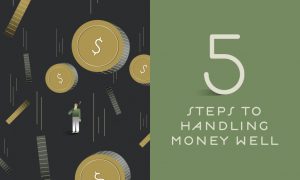Should Christians Seek Financial Freedom?
Written by Rachel Lee, Malaysia. Originally written in Simplified Chinese
“Tired of your nine-to-five job? Sign up for this free course and learn how to be your own boss!”
“Never enough money for spending? Message me, and I’ll teach you how to earn some side income!”
“Not yet investing in stocks? Then you’re behind the times! Join our team and learn right away!”
“Do you know what financial freedom is? It’s a state where you do not have to work, yet money finds its way to your wallet to meet your daily needs. Want to know how to achieve this? Contact me at once!”
Every time I log on to my social media accounts, I spot ads like these everywhere. After seeing so much along the lines of,
“When you have money, not only do you have more choices, you can say ‘no’ to what you don’t like,” or
“Hustle, and your future self will thank you for it,”
I began to feel an itch and wonder how I could increase my own wealth. Seeing how well my business and investment friends were doing, I couldn’t help but feel dissatisfied with where I was. I wanted to earn more money so I could pay off my debts sooner, and even bring my family to travel around the world. So, I began looking online for business opportunities.
This isn’t really new for me. Back in 2016, when I was still a student, I had already written an article about wanting to earn money. That was my attitude then towards “making money”, since I did not have any income at the time. But now that I’d already started working and had a stable income, I still wanted to earn more. So I wondered: was it because I was not content?
When I considered my motives, I realised that I wanted to achieve financial freedom not for the sake of living a luxurious life. Instead, my hope is that by achieving greater financial capability, I could afford to let my family live more comfortably. Plus, if I ever feel called to a short-term mission trip somewhere, then I would be able to immediately pay for it and set off without a worry. All these motives seem reasonable, do they not?
So . . . as a Christian, can I really pursue financial freedom?
With such questions, I started searching the Bible, wanting to know what God had to say about wealth. After all, “All Scripture is God-breathed and is useful for teaching, rebuking, correcting and training in righteousness” (2 Timothy 3:16). Below are some of my findings. I hope that what I have learned can also help answer some of your questions.
According to a newspaper article, there are about over 2,000 verses in the Bible about money, but just over 500 verses each about prayer and faith. It’s safe to say that our views on money cannot be overlooked.
On its own, money is neutral. Whether it is good or bad depends on how people spend it. Money is not the root of all evil, it is the love of money that is the root of all evil (1 Timothy 6:10). And so, whenever the Bible talks about money, it talks about how people perceive and use money.
That said, here are three things to keep in mind when it comes to our relationship with money as believers:
1. Recognise that money is given by God
First, we must recognise that all things, including money, come from God. King Solomon, full of wisdom and possessing great wealth, once said, “When God gives someone wealth and possessions, and the ability to enjoy them, to accept their lot and be happy in their toil—this is a gift of God” (Ecclesiastes 5:19).
However, we must not only think so when we are wealthy, but even when we are poor. When Job had lost his children, his property, and his health, he was still able to say, “Naked I came from my mother’s womb, and naked I will depart. The Lord gave and the Lord has taken away; may the name of the Lord be praised” (John 1:21). This shows that his reverence for God is far greater than his pursuit of wealth and peace. Job’s faith is an example for us.
Let us trust that God will provide everything we need, and be thankful for what we have.
2. We are merely stewards of the money
Once we recognise that money comes from God, then we place ourselves in our rightful position—as God’s steward. Since He has given us the money, then we ought to manage it well.
This brings us into financial management. Our income can be divided into two groups: active and passive income.
A. Active income—the income we gain from doing work:
1 Timothy 5:18 says that “The worker deserves his wages.” It is right that we receive the proper wages from the companies we serve. This verse also reminds Christian business owners that we must pay employees the wages that they have earned.
The Bible does not condemn side hustles. But, it does clearly state earning methods prohibited by God, such as bribery (Micah 3:11), by luck (Isaiah 65:11-12), an inheritance claimed too soon (Proverbs 20:21), theft, falsehood, lying (Leviticus 19:11).
B. Passive income—where money earns money:
Matthew 25:14-30 tells the parable of a master who gave his servants five bags of gold, two bags of gold, and one bag of gold. People typically turn to this as a reminder for us to put to good use the skills God has gifted us. But I believe this can also be, in principle, a good reminder about money: we should treat seriously the money that God has blessed us with—by using wise methods to increase the value of money, whether by savings in a bank, or investing in funds.
God does not value money more than us, nor does He use it to measure us. He wishes for us to effectively use the resources He’s given. As we thank Him for what we have, we ought also to learn how to manage it well, so as to steward well his gifts.
3. Learn to manage finances without being greedy
Once we set out on the path of financial management, we could end up going further than expected. We could be managing our finances well and end up with more money, which would require us to put even more energy into it, to the point that we lose sight of God in all of it. Or, we might lose money because we did not manage our finances well, and end up blaming God.
Whichever the situation may be, they could all stem from a heart of greed, when, subconsciously, our love for money becomes greater than our love for God. Money then becomes our “master”, while God becomes our “steward” when we subconsciously think that He’s obligated to help us increase our wealth.
If we want to know whether or not we’ve become greedy, and have unwittingly allowed money to become our master, we can simply look at our attitude towards offering. Offering is a good way of testing whom we think our money belongs to.
If we feel like the money is ours because we earned it, and offering the money to the church will not increase the money, then offering even just one per cent will not feel good for us. But if we are able to joyfully give, then that pleases God. “Each of you should give what you have decided in your heart to give, not reluctantly or under compulsion, for God loves a cheerful giver” (1 Corinthians 9:7).
In line with these three points, I’ve come up with a new definition of “financial freedom” for myself:
- Freely praise God, for everything I possess comes from Him.
- Freely earn for God’s sake, and freely say “no” to earning methods that displease God.
- Freely manage finances for God’s sake, calculating expenses, and not increasing income through methods that displease God (such as buying the lottery).
- Freely offer it all to God: joyfully give the money we have for God’s kingdom.
As John 8:32 says, “You will know the truth, and the truth will set you free.” Whether or not I can achieve financial freedom by this world’s standards, I know that if I pursue God’s truth, then I will possess the true freedom that comes from God: to freely live in God’s love and grace, not bound by sin, and able to reject financial temptations and refuse to do anything that displeases God.












Leave a Reply
Want to join the discussion?Feel free to contribute!